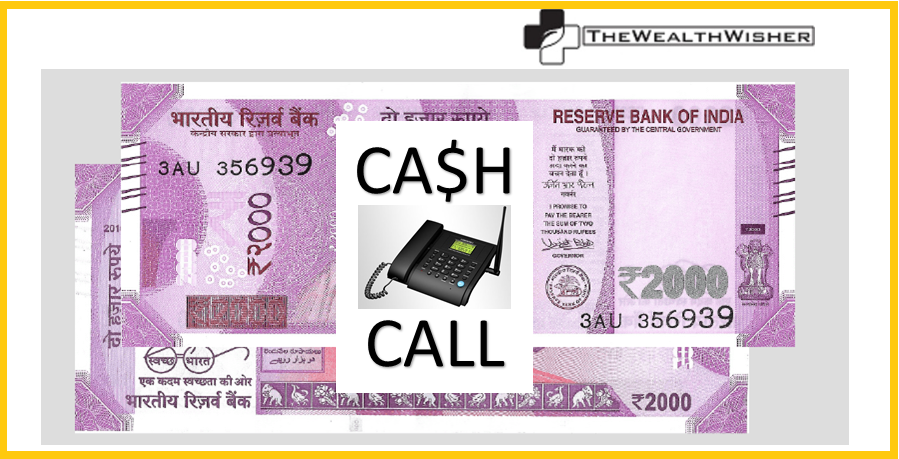You know last week in news it said: “ Indian Forex Reserve is down by 1% due to increase in fuel bill”. So a country is also concerned about its cash balance. We all know what happened in 1991 and how Dr. Manmohan Singh tackled the situation. So cash is really important in managing a household too. But have we thought about – Role of Cash in Portfolio? How much cash one should hold? Let’s try to understand the importance & amount of cash one should be having.
Before discussing how much cash lets check why do investors hold cash?
We have interacted with hundreds of investors and found that they hold cash for simple 3 reasons:
- Emergency
- Opportunity
- Lack of usage (I don’t know what to do with it?)
Although holding cash to wait for some “right opportunity” may sound tempting, but how many of us are qualified to identify the so-called opportunity.
Cash as Contingency Planning
 Investment Strategy focuses on the risk-return profile, balancing of debt and equity portions and managing risk. One portion of the portfolio which is cash is not given much attention, because seldom investors disclose cash levels.
Investment Strategy focuses on the risk-return profile, balancing of debt and equity portions and managing risk. One portion of the portfolio which is cash is not given much attention, because seldom investors disclose cash levels.
Hence we (planners) come forward and ask how much cash you have presently? We also answer how much to hold for contingency.
For most people, the absolute minimum level of cash to keep in emergency fund amounts to six months of expenses. Contingency Fund not only manages your household during crisis time, it also helps you to keep your long-term investments intact.
We all know the suffering when we have to pull out money from retirement or children’s education fund.
Considerations in Holding Cash
Some investors feel that holding cash is like holding a weapon – the option to take advantage of volatility in the market. This is a right approach.
So when the volatile stock market provides you an opportunity to buy good assets at bargain prices, you should have cash in hand to take advantage of market’s irrationality.
But many times opportunities arise suddenly. How many of us have the courage to buy when markets correct 20% or more?
The fear makes the cash non-usable.
Don’t you think instead of this one should invest regularly and not accumulate cash in portfolio? This can be done by SIPs.
When you have a large sum, you should not rush to invest it but rather take sufficient time to plan a strategy. If you are not getting the desired level of correction, if appropriate, get into the market in a staggered way.
When you are invested in an asset class that has had a big run-up in prices, you might take some risk off the table by converting some of your investment to cash. This is called re-balancing. This may have tax implications & it may leave you with cash in hand undecided where to reinvest.
Optimum Cash Levels – How Much Cash To Hold?
Your financial planner may help you decide the level of cash you should hold for emergencies. It could be 3 months or more depending on factors like age, job security, family composition & existing liquid assets.
The answer to question how much cash holding also depends upon the age of the individual. While cash holding of 5-10% of total financial assets is sufficient for a young family, retired people should keep a higher percentage, say 10-15% of their financial assets in cash. This will help to meet recurring expenditure or any medical emergencies.
Holding cash carries its own costs as well. Cash does not earn any interest, except for that lying in saving account deposits or liquid funds. Inflation eats into the purchasing power of idle cash.
Another drawback of holding cash is the opportunity cost of earning more returns in the equity or long-term debt market.
Cash & Timing the market
Studies have proved that by timing the market more often investors miss the best days and hence earning significantly less than what they could have earned by staying invested.
Reasons are – Most investors get out when it’s too late and wait way too long to get back in. They lose compounding and missing out on gains.

Investors need to understand the difference between buying specific assets that are attractively valued after a dip, and timing the market as a whole. Holding cash in order to wait for that right opportunity may sound tempting but it is extremely difficult to implement in the real market scenarios.
Even experienced mutual fund managers are known for taking wrong calls every now and then. In such a case, it is advisable to maintain only as much cash as is necessary for emergency situations.
Investors should first decide his broad financial asset allocation among equities, debt, and cash depending on his risk-return profile and liquidity requirements. He should at intervals keep reviewing his portfolio and re-balance it.
Hope now you know the benefits and trade-off of holding cash. Also you must be able to know how much cash is optimum?
Hence we recommend financial planning because it takes care of all your assets and cash is one of them.
Share the article using the social media options and feel free to comment in the section below.










